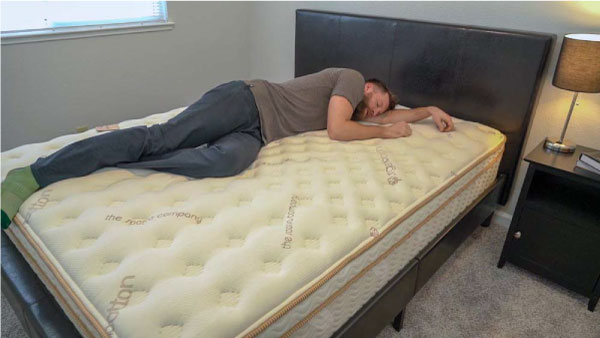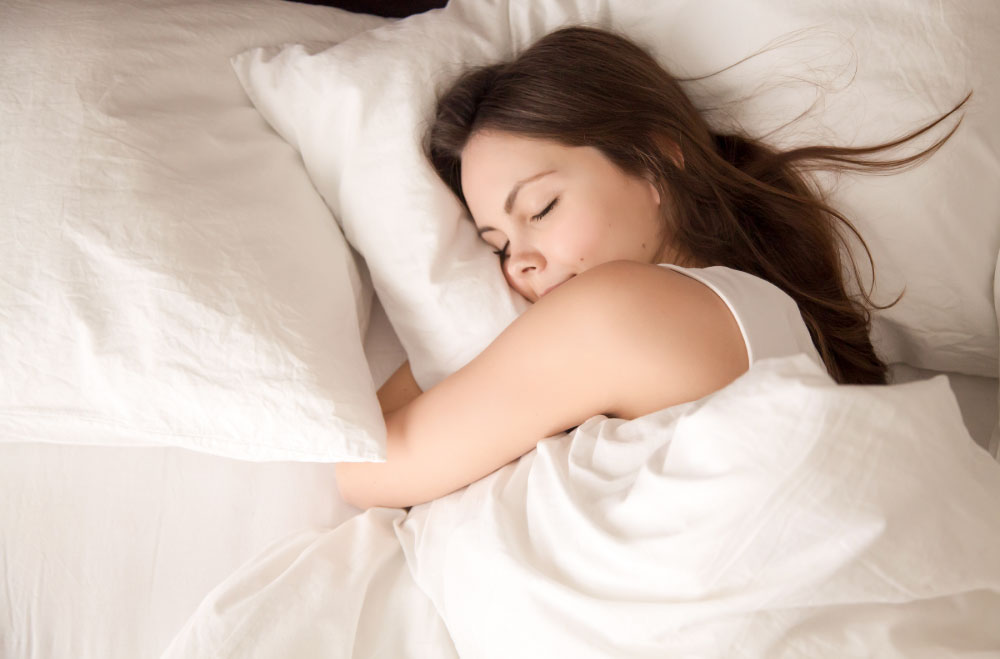A helpful guide to getting deeper sleep at night so you can wake up feeling well rested.
Do you ever get a full night’s sleep, but still wake up groggy, or feeling like you haven’t slept at all? That could be because you’re not getting enough deep sleep and REM sleep through the night. Sleep specialists recommend adults get around 1.5-1.8 hours of REM sleep per night, which is about 20% of your sleep total.
Deep sleep is stages 3 and 4 of your sleep cycle, where your brain waves will become very slow and blood flow will be directed toward your muscles, preparing you for REM.
REM sleep is an acronym for rapid eye movement. REM sleep is the mentally restorative part of our sleep cycle, and is very important for feeling rested the following day. This is also when we dream most vividly, because our brain is so active during this stage.
Our sleep follows a pattern, though. You move back and forth between deep sleep and REM sleep four to six times a night. Each cycle lasts around 90-120 minutes, and as the night progresses, the amount of time you spend in each stage changes. Most deep sleep occurs in the first half of the night, and then later in the night, REM sleep stages become longer.
Keeping reading to learn some tips and tricks for achieving more deep sleep and REM sleep.
Keeping A Consistent Sleep Schedule
We all know the feeling of waking up early for school or work during the week and longing to stay up late and sleep in on the weekends, but, unfortunately, that sleep pattern isn’t doing you any favors. Going to bed and waking up around the same times every day, along with consistently getting seven to nine hours, are critical steps to getting better quality sleep.
Helix’s co-founder and sleep expert, Adam Tishman, supports this, saying, “Try to go to sleep and wake up at the same time every day, even on weekends. Having a regular sleep schedule will help increase REM and the overall quality of your sleep.”
This is because our bodies run on a 24-hour internal clock, and they do best when we have a regular circadian rhythm. By creating routine, such as a bedtime routine, the body learns to follow it with the appropriate hormones (in this case, cortisol and melatonin), to maintain the rhythm. This means your body is more prepared to go to sleep, and therefore is more prepared for sleep cycles.
Go To Bed Earlier
This is more important than you think. Because we enter into our deep sleep and REM sleep in the later hours of our sleep cycle, it’s important to get a good head start so you have time to enter those final REM stages. And if you wake up in the middle of a REM cycle? That usually means you’ll have an extra groggy morning, or even one of those days where it feels like you never fully wake up. Stanford University reported that waking up during deep or REM sleep affected about 15.2% of the 16,000 people surveyed over a year, and that the effects could last for a while through the day.
While we all wish we could just sleep in a bit later, this usually isn’t an option. We recommend starting your bedtime adjustment by just 15 minutes each day. Get ready for bed 15 minutes earlier, so you’ll be in bed 15 minutes earlier. Add another 15 minutes every day, and by the end of the week, you’ll hopefully be heading to bed a full hour earlier, giving you more time to accomplish that precious REM.

Creating Your Best Sleep Environment
Another reason you’re lying awake in bed at night, not being able to fall asleep, is because of distractions in your sleep environment. Make sure your room is cool, dark, and quiet. If you live in a loud area, white noise machines are a great way to dull distracting noises. Adding a fan in your room or getting a cooling mattress could also help if you don’t like to sleep warm at night.
You should limit screen time by at least an hour before you plan on going to bed. “The blue light emanating from [screens] disrupts circadian rhythms,” explains Tishman. And make sure the TV in your room is completely off, too, because even a subtle glow can be disruptive. Better yet, no TVs in the bedroom, because ideally, it should be an area of the home that is dedicated to relaxation and recovery.
Also, do a quick check of your mattress. How long have you had it? Is it sagging or lumpy? Do you wake up feeling stiff and achy? How about your sheets? Are they scratchy and warm? A comfortable and accommodating mattress for your sleeper type is a critical tool for great sleep, along with your pillows and sheets, so seriously consider if it’s time to upgrade your sleep situation.
Think of it this way—you should look forward to winding down and hopping into bed each night. You might need to change a few things in your room to create your best sleep environment, but it will most likely lead to better sleep, making you more prepared for the day ahead.
Be Aware of What You Eat and Drink Before Bed
That nightcap isn’t helping you out when it comes to your sleep cycle. Tishman recommends, “no alcohol or caffeine too close to bedtime. Caffeine and alcohol interfere with your natural sleep process and having either of these too close to bedtime disrupts your natural body chemistry and can keep you awake.”
Even though alcohol may initially help you to fall asleep, it disrupts your typical sleep cycle later in the night after you metabolize the sugar, and can decrease your overall sleep quality by limiting your brain’s ability to enter deep or REM sleep. We recommend replacing your nightly cocktail with a cup of warm herbal tea instead.
Caffeine has a half-life of four hours, so half of the caffeine you consumed at 7 p.m. is still in your system by 11 p.m. Caffeine can be found in coffee, non-herbal teas, soft drinks, chocolate, and some pain relievers. Try to limit your consumption of these after 3 p.m., or better yet, try to avoid them completely if you’re particularly sensitive to the effects of caffeine.
Practice healthy habits during the day
Getting good sleep during the night can start with what you do early in the day.
Daily exercise lasting 20-30 minutes and working up a sweat is a great example. The National Sleep Foundation conducted an analysis exploring the relationship between sleep and exercise, where they found consistent results that exercise increased total sleep time and prolonged REM sleep. Just make sure that you don’t work out too close to bedtime as it can raise cortisol levels, which can keep you up. Try to workout about five to six hours before your bedtime.
Naps can impact sleep cycles, as well. Don’t get us wrong, we love a good nap as they can help with boosting alertness, mood, and productivity. But this is only in cases of short time periods, and if you didn’t get enough sleep the night before.
If you want (or need, we’ve all been there) to take a nap, consider how much time you have to dedicate. Naps of 45 minutes or less probably won’t have you drifting into deep sleep or REM sleep, which will make you better able to spring into action once you’re done. Naps that are 90 to 120 minutes will encompass all of the sleep stages, and can help to clear your mind, improve memory, and recoup from lost sleep, but may hinder you from being able to fall asleep at your regular bedtime come night, which will in turn hinder deep/REM sleep cycles. Only opt for naps that are 90 to 120 minutes long if you are sleep deprived from the night before.
Naps any longer than 120 minutes will most likely trick your body into thinking that you are going for a full night’s sleep, which means you will either wake up mid deep/REM sleep, or it might disrupt your sleep more drastically that night.
This post was written in partnership with our friends at the Slumber Yard, an independent mattress and home goods review website.





